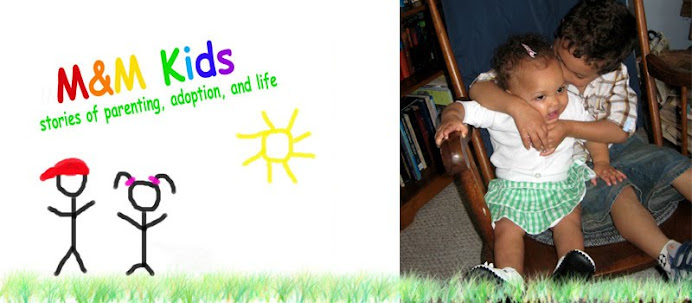There's been some controversy with the new census and the now millions of multi-racial families. And, like many things, it's not so black and white.
My kids are mostly Hispanic (Puerto Rican to be exact), with a little african american thrown in, and possibly more. Now, here's why it was so hard. Hispanic isn't a race. Most minority or multi-racial people filling out the census are basing it on how other people perceive them. Or what they look like.
If you are biracial (african-american and caucasian) but have african-american features and even just light brown skin, most people will lump you with the black population.
So...Mateo does not look white, even though he's not really black. He has medium brown skin but wavy brown hair. What do we put for his race? Technically, hispanic people are caucasion "of hispanic origin". But that wasn't an option for the race category.
For us, in hearing how other minorities were filling it out, we chose to mark the kids based on what they looked like. So for Mateo we checked off caucasian and black. For Maya, because she has much lighter skin, we just checked caucasion.
Under the ethnicity question, we checked Hispanic (specified as Puerto Rican) for both of them.
I can see why there's been such commotion about it. What about you? Did you have any trouble filling out the census this year?
*** Edit to add***
(written by J-momma's husband, and statistics expert)
Re: Janiece's question below:
just wanted to answer your question on the bio vs adopted question on the census: You're partially right, the differentiation between bio, step, adopted, foster, etc.. does not affect the distribution of the # of representatives and other major "population" issues. It does effect the distribution of federal funds. The US Government supports and subsidizes domestic and international adoption through many different grant programs (to individuals, organizations, state governments, researchers, etc...) Grant money disbursed to the States is based on population (and their current adoption stats). For instance, if Congress wants to vote to increase the current $11,000 tax credit for adoption expenses to, say, $15,000 then they need to know what it's going to cost the taxpayers. They use census data (along with many other things) to predict those costs.
The census could also be used to analyze statistical discrepancies between reported domestic private and relative adoptions. How many people identify the children living with them as "adopted", yet have not gone through the court system to receive legal guardianship? Not sure, the census data would help answer those types of questions.
The census is also used for many "non-governmental" reasons. The data (once compiled) is open and available to every US citizen, organization or company. The data is used for everything from determining advertising demographics to predicting trends in housing upstarts. The company I work for uses census demographic data to predict pre-k / kindergarten enrollment in particular school districts and, in turn we invest more money in marketing to those school systems that we predict will have an increase in enrollment (and in turn, need more stuff).
Here's a link to the census dept.'s Adoption statistics report from the last (2000) census. Since 2000 was the first time that adoption was an option, it will be very interesting to compare the differences between this report and the report that will (presumably) be issued in the years following the 2010 census.

Oh yeah--and I've said a few things about it. First of biological vs. adopted. While I see the reasoning behind it--why add that addition distinction into things? Does it really matter? How does that affect aid? Next--we don't know exactly what the kids origin is--Julia looks caucasion--but then look at her eyes. Total Buryat (Asian). She's also from Asia. Then the boys. There is a whole other issue. Chewie was just "found". We think he is Krygz--but ??????
ReplyDeleteWow. I never really thought of that. We breezed right through our form in less than five minutes. I wonder what would have happened if you'd just written in some of the answers.
ReplyDeleteJust so you know you can add as many race's as you want... Not just one.. and the census Enumerators take what ever answers you give The race question comes down to funding too just like the adoption question.. HTH
ReplyDelete